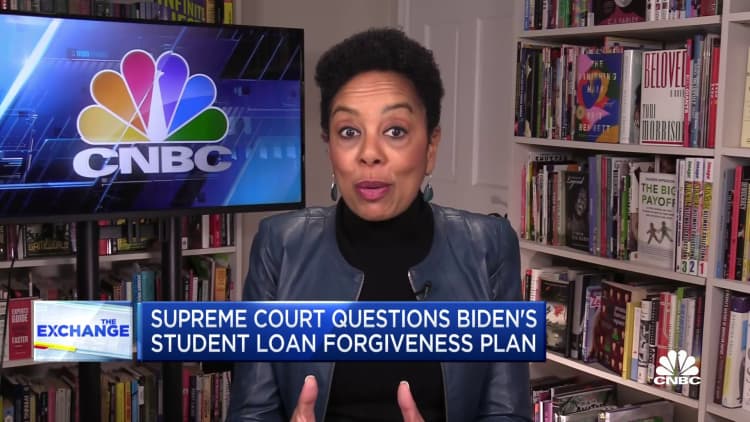Riska | Istock | Getty Images
Payments likely to resume within months

The Education Department in November said student bills would resume 60 days after the litigation over its student loan forgiveness plan resolves. If the high court hasn’t ruled on the plan by the end of June, or if the Education Department is unable to carry out its relief by then, the bills will pick up at the end of August.
It’s possible the White House could try to extend the pause again, Kantrowitz said. He noted that the Education Department had said on two occasions that a previous extension of the payments pause would be the final one — only to prolong the pause yet again.
Still, it would be wise for borrowers to be prepared for the bills to resume sooner rather than later.
Deferments may keep interest from accruing
When the break ends, you may be able to postpone your student loan payments for more time by requesting a deferment or a forbearance.
Borrowers should first see if they qualify for a deferment, because their loans may not accrue interest under that option, whereas they almost always do in a forbearance, experts say.
If you’re unemployed when student loan payments resume, you can request an unemployment deferment with your servicer. If you’re dealing with another financial challenge, you may be eligible for an economic hardship deferment.
Those who qualify for a hardship deferment include people receiving certain types of federal or state aid and anyone volunteering in the Peace Corps, Kantrowitz said.
With both a hardship and an unemployment deferment, interest generally doesn’t accrue on undergraduate subsidized loans. Other loans will rack up interest, however.
The maximum time you can use an unemployment or hardship deferment is usually three years per type.
Other, lesser-known deferments include the graduate fellowship deferment, the military service and post-active duty deferment and the cancer treatment deferment.
Forbearances also keep bills on hold
Student loan borrowers who don’t qualify for a deferment may request a forbearance.
Under that option, borrowers can keep their loans on hold for as long as three years. However, because interest accrues during the forbearance period, borrowers can be hit with a larger bill when it ends.
Kantrowitz provided an example: A $30,000 student loan with a 5% interest rate would increase by $1,500 a year under a forbearance.
A deferment or forbearance should be a last resort, but they are better than defaulting on the loans.
Mark Kantrowitz
higher education expert
If a borrower uses a forbearance, he recommends they at least try to keep up with their interest payments during the pause to prevent their debt from increasing.
“A deferment or forbearance should be a last resort, but they are better than defaulting on the loans,” Kantrowitz said.
Betsy Mayotte, president of The Institute of Student Loan Advisors, a nonprofit, said she recommends borrowers only use a forbearance or deferment for short-term hardship, including a sudden big medical expense or period of joblessness.
Struggling borrowers are best off finding a payment plan they can afford, said Mayotte.
Other options for struggling borrowers
Currently, the Biden administration is working to roll out a new repayment option under which borrowers would pay just 5% of their discretionary income toward their undergraduate student loans. The savings would be huge.
According to an example provided by Kantrowitz, a borrower who made $40,000 a year would currently have a monthly student loan payment of around $151 under the existing Revised Pay As You Earn Repayment, or REPAYE, plan. But with the new option, that monthly bill would plummet to $30.
And some borrowers wouldn’t owe anything each month.
To determine how much your monthly bill would be under different plans, use one of the calculators at Studentaid.gov or Freestudentloanadvice.org.
 EU News Digest Latest News & Updates
EU News Digest Latest News & Updates



